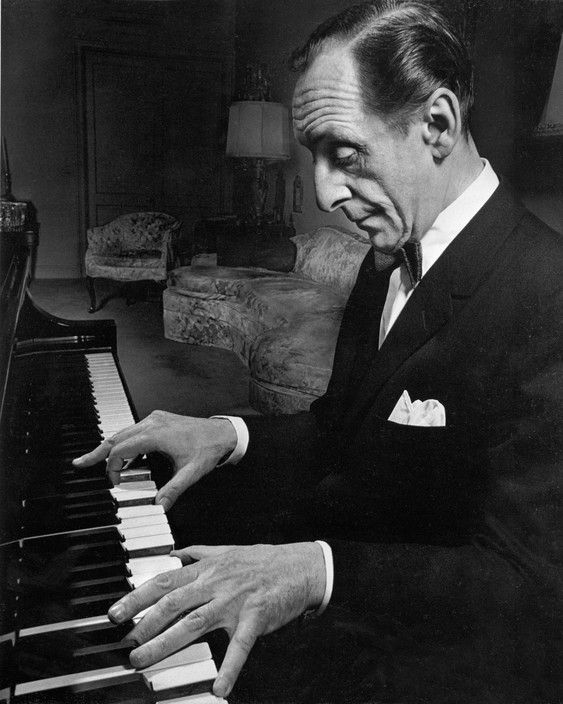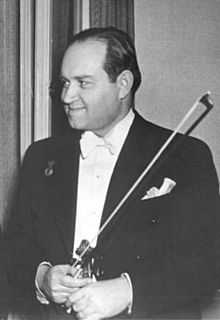This Week in Classical Music: September 28, 2020.Instrumentalists.While there are no significant dates associated with composers this week, there are plenty of wonderful names to celebrate among the people who interpret composers’ music.Let’s start with the pianists.Vladimir Horowitz was born on October 1st of 1903 in Kiev, Ukraine, (then the Russian Empire) into a well-off Jewish family (Horowitz’s grandfather had a special merchant rank that allowed him to live outside of the Pale of Settlement; after the Revolution their assets were expropriated and the family impoverished).At the age of nine Horowitz entered the Kiev Conservatory where he studied with Felix Blumenfeld, among others.He made his solo debut in 1920; around that time, he met the violinist Nathan Milstein, who was the same age and showed great talent.They played together in concerts (Vladimir’s sister Regina was Milstein’s accompanist).Both Horowitz and Milstein left Russia in 1925; Vladimir went first to Berlin and then to the US.His debut, on January 12th of 1928, when he played Tchaikovsky’s First piano concerto faster than Thomas Beecham would have it and dazzled the public with his technique, became legendary.That was the beginning of one of the most brilliant pianist careers of the 20th century, even though Horowitz interrupted it four times, first from 1936 to 1938, then from 1953 to 1965, his longest absence from the concert stage, and again in 1969–74 and 1983–85.Altogether, he was away from the public for a long 21 years.That didn’t prevent him from becoming both a celebrity and one of the most interesting pianists of the century.
Vera Gornostayeva was practically unknown in the West, even though she was highly regarded by first the Soviet and then the Russian musical community as a very talented and “thinking” musician.She was also born on October 1st, in 1929, in Moscow.She studied with Heinrich Neuhaus at the Moscow Conservatory and then taught there for 50 years.One of her pupils, Vassily Primakov, was instrumental in publishing Gornostayeva’s CDs and bringing her art to the attention of the American public.She became a favorite of the listeners of WFMT, a Chicago classical music station.Gornostayeva had many students, among them Alexander Slobodyanik, Eteri Andjaparidze and Sergei Babayan.
David Oistrakh was also born this week, on September 30th of 1908.As a violinist he occupies a place in the musical pantheon similar to Horowitz.Oistrakh was bon in Odessa, that cradle of Jewish violin virtuosos.Oistrakh studied with Pyotr Stolyarsky, as did Nathan Milstein, and played a concert with him in 1914.Oistrakh made his big debut in Leningrad in 1928, the year Horowitz made his debut in New York.In the 1930s the Soviets were keen to demonstrate their cultural achievement, and music competitions became politically important.Oistrakh excelled in them, winning many (among them the first prize in the prestigious Concours Eugène Ysaÿe in Brussels in 1937) and earned accolades at home and abroad.Oistrakh was one of the first Soviet musicians to travel to the West – he was allowed to play in Finland in 1949.In 1955 he went to the US for the first time, playing, to great acclaim, Shostakovich’s First Violin concerto, which the composer dedicated to him.Oistrach was a wonderful interpreter of the music of Bach.here’s Bach’s Violin Concerto no. 1 in A minor.David Oistrakh is accompanied by the Vienna Symphony, Georg Fischer conducting.
Instrumentalists, 2020
This Week in Classical Music: September 28, 2020. Instrumentalists. While there are no significant dates associated with composers this week, there are plenty of wonderful names to celebrate among the people who interpret composers’ music. Let’s start with the pianists. Vladimir Horowitz was born on October 1st of 1903 in Kiev, Ukraine, (then the Russian Empire) into a well-off Jewish family (Horowitz’s grandfather had a special merchant rank that allowed him to live outside of the Pale of Settlement; after the Revolution their assets were expropriated and the family impoverished). At the age of nine Horowitz entered the Kiev Conservatory where he studied with Felix Blumenfeld, among others. He made his solo debut in 1920; around that time, he met the violinist Nathan Milstein, who was the same age and showed great talent. They played together in concerts (Vladimir’s sister Regina was Milstein’s accompanist). Both Horowitz and Milstein left Russia in 1925; Vladimir went first to Berlin and then to the US. His debut, on January 12th of 1928, when he played Tchaikovsky’s First piano concerto faster than Thomas Beecham would have it and dazzled the public with his technique, became legendary. That was the beginning of one of the most brilliant pianist careers of the 20th century, even though Horowitz interrupted it four times, first from 1936 to 1938, then from 1953 to 1965, his longest absence from the concert stage, and again in 1969–74 and 1983–85. Altogether, he was away from the public for a long 21 years. That didn’t prevent him from becoming both a celebrity and one of the most interesting pianists of the century.
celebrate among the people who interpret composers’ music. Let’s start with the pianists. Vladimir Horowitz was born on October 1st of 1903 in Kiev, Ukraine, (then the Russian Empire) into a well-off Jewish family (Horowitz’s grandfather had a special merchant rank that allowed him to live outside of the Pale of Settlement; after the Revolution their assets were expropriated and the family impoverished). At the age of nine Horowitz entered the Kiev Conservatory where he studied with Felix Blumenfeld, among others. He made his solo debut in 1920; around that time, he met the violinist Nathan Milstein, who was the same age and showed great talent. They played together in concerts (Vladimir’s sister Regina was Milstein’s accompanist). Both Horowitz and Milstein left Russia in 1925; Vladimir went first to Berlin and then to the US. His debut, on January 12th of 1928, when he played Tchaikovsky’s First piano concerto faster than Thomas Beecham would have it and dazzled the public with his technique, became legendary. That was the beginning of one of the most brilliant pianist careers of the 20th century, even though Horowitz interrupted it four times, first from 1936 to 1938, then from 1953 to 1965, his longest absence from the concert stage, and again in 1969–74 and 1983–85. Altogether, he was away from the public for a long 21 years. That didn’t prevent him from becoming both a celebrity and one of the most interesting pianists of the century.
Vera Gornostayeva was practically unknown in the West, even though she was highly regarded by first the Soviet and then the Russian musical community as a very talented and “thinking” musician. She was also born on October 1st, in 1929, in Moscow. She studied with Heinrich Neuhaus at the Moscow Conservatory and then taught there for 50 years. One of her pupils, Vassily Primakov, was instrumental in publishing Gornostayeva’s CDs and bringing her art to the attention of the American public. She became a favorite of the listeners of WFMT, a Chicago classical music station. Gornostayeva had many students, among them Alexander Slobodyanik, Eteri Andjaparidze and Sergei Babayan.
David Oistrakh was also born this week, on September 30th of 1908. As a violinist he occupies a place in the musical pantheon similar to Horowitz. Oistrakh was bon in Odessa, that cradle of Jewish violin virtuosos. Oistrakh studied with Pyotr Stolyarsky, as did Nathan Milstein, and played a concert with him in 1914. Oistrakh made his big debut in Leningrad in 1928, the year Horowitz made his debut in New York. In the 1930s the Soviets were keen to demonstrate their cultural achievement, and music competitions became politically important. Oistrakh excelled in them, winning many (among them the first prize in the prestigious Concours Eugène Ysaÿe in Brussels in 1937) and earned accolades at home and abroad. Oistrakh was one of the first Soviet musicians to travel to the West – he was allowed to play in Finland in 1949. In 1955 he went to the US for the first time, playing, to great acclaim, Shostakovich’s First Violin concerto, which the composer dedicated to him. Oistrach was a wonderful interpreter of the music of Bach. here’s Bach’s Violin Concerto no. 1 in A minor. David Oistrakh is accompanied by the Vienna Symphony, Georg Fischer conducting.
a place in the musical pantheon similar to Horowitz. Oistrakh was bon in Odessa, that cradle of Jewish violin virtuosos. Oistrakh studied with Pyotr Stolyarsky, as did Nathan Milstein, and played a concert with him in 1914. Oistrakh made his big debut in Leningrad in 1928, the year Horowitz made his debut in New York. In the 1930s the Soviets were keen to demonstrate their cultural achievement, and music competitions became politically important. Oistrakh excelled in them, winning many (among them the first prize in the prestigious Concours Eugène Ysaÿe in Brussels in 1937) and earned accolades at home and abroad. Oistrakh was one of the first Soviet musicians to travel to the West – he was allowed to play in Finland in 1949. In 1955 he went to the US for the first time, playing, to great acclaim, Shostakovich’s First Violin concerto, which the composer dedicated to him. Oistrach was a wonderful interpreter of the music of Bach. here’s Bach’s Violin Concerto no. 1 in A minor. David Oistrakh is accompanied by the Vienna Symphony, Georg Fischer conducting.